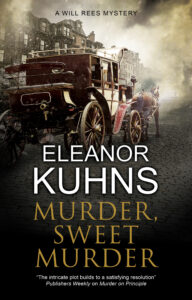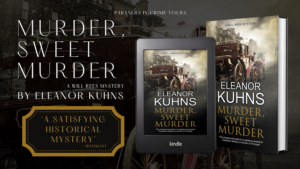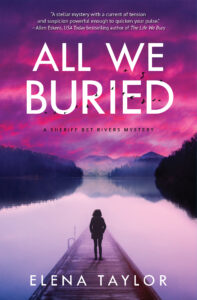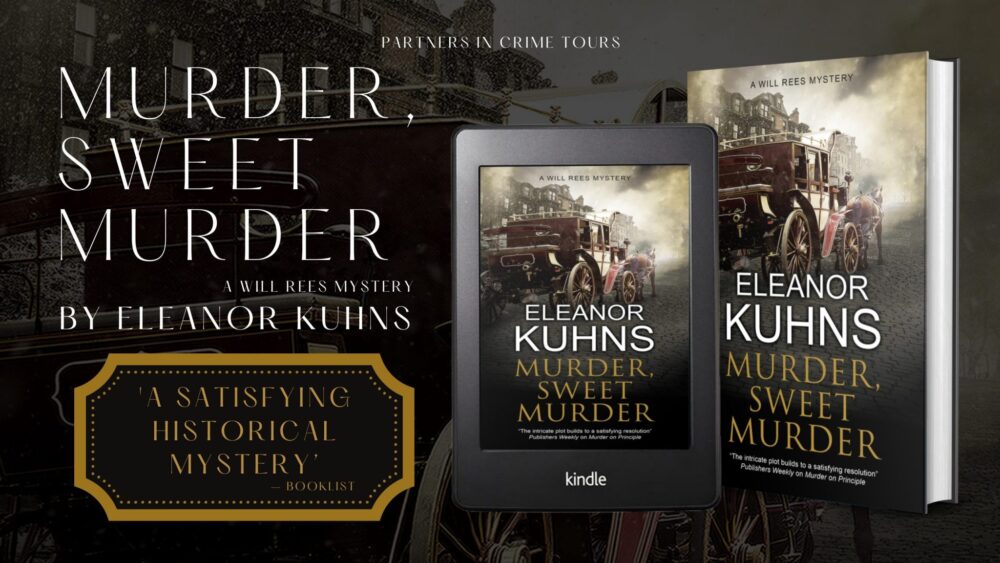Historical Mystery, Murder, Sweet Murder by Eleanor Kuhns
Guest Post + Book & Author Info + Giveaway!
Historical Mystery — Murder, Sweet Murder
 Will Rees accompanies his wife to Boston to help clear her estranged father’s name in this gripping mystery set in the early nineteenth century.
Will Rees accompanies his wife to Boston to help clear her estranged father’s name in this gripping mystery set in the early nineteenth century.
January, 1801. When Lydia’s estranged father is accused of murder, Will Rees escorts her to Boston to uncover the truth. Marcus Farrell is believed to have murdered one of his workers, a boy from Jamaica where he owns a plantation. Marcus swears he’s innocent. However, a scandal has been aroused by his refusal to answer questions and accusations he bribed officials.
As Will and Lydia investigate, Marcus’s brother, Julian, is shot and killed. This time, all fingers point towards James Farrell, Lydia’s brother. Is someone targeting the family? Were the family quarreling over the family businesses and someone lashed out? What’s Marcus hiding and why won’t he accept help?
With the Farrell family falling apart and their reputation in tatters, Will and Lydia must solve the murders soon. But will they succeed before the murderer strikes again?
To purchase Murder, Sweet Murder, click on any of the following links: Amazon | Barnes & Noble | Goodreads
Genre: Historical Mystery
Published by: Severn House Publishers
Publication Date: February 1st 2022
Number of Pages: 224
ISBN: 0727850091 (ISBN13: 9780727850096)
Series: Will Rees Mysteries #11
Historical Mystery Author — Eleanor Kuhn — Guest Post
Although I write historical mysteries that take place in the Federalist period, roughly from the late 1700s to early 1800’s, I always include real life problems for Will Rees, my protagonist, and his family. Events will naturally affect people (in this case, my characters), but they will also have their own dreams and their own challenges.
Because his wife Lydia Rees is a very important piece of the crime solving partnership, I frequently examine the constraints on women. Women had few rights at this time. They couldn’t vote and a widow could not inherit from her husband unless he specifically named her in his will. Instead, she became the charge of her eldest son. You can imagine how well that worked out, especially if mother and son were on poor terms.
In Murder, Sweet Murder, I take a slightly different tack. I spend some time on Rees and Lydia’s adopted daughter Jerusha and her dream of becoming a teacher.
But first, some background.
When Lydia receives a frantic letter from her sister Cordelia begging her to come to Boston, Lydia’s first impulse is to refuse. She has been estranged from her father for years, fleeing her childhood home and taking refuge with the Shakers in Maine. Now her father has been accused of murder — and Lydia suspects he may be guilty. Marcus Farrell has become wealthy from his involvement in the Triangle Trade; using the molasses byproduct from the production of sugar to distill into rum, and then using the rum to buy slaves in Africa. But he is still her father.
But Lydia has intended to visit someday, and look for a school for Jerusha, as well as showing off new baby Sharon. Although Jerusha has gone through the local dame school and knows how to read and write, already more than half of the women of that time could do, she desperately wants to become a teacher and to achieve her goal she needs more education.
So, Rees and Lydia take Sharon and Jerusha and set off for Boston.
Although Rees knew Lydia came from money, he is shocked and dismayed by the wealth of the Farrell family. They in turn, are scornful of these country cousins. Jerusha, in particular, has a difficult time. She is sharing a room with Cordelia, Lydia’s sister. A flighty girl, Cordelia is concerned only with parties, clothes, and making a good marriage. Jerusha is a quiet studious girl determined to further her education. While Cordelia is sneaking out of the house to meet a young man, Jerusha is reading and studying. She is, in the derogatory vernacular of the times, a bluestocking.
As Rees and Lydia begin investigating the first murder, and then shortly thereafter the second — this time Marcus Farrell’s brother, Jerusha reminds them she is there to look at a school. Schools for girls were new. Illiteracy was endemic and families who educated any of their children usually schooled the boys. In Boston, an educator named Caleb Bingham had set up a school for girls. Lydia had attended it as a young woman. The school was there although it had been taken over by the Boston School System.
Rees and Lydia squeeze in a visit to the school before they follow a lead to a run-down boarding house on the poor side of town — and a wild pursuit of a suspect through the Boston streets.
A third murder occurs in an ordinary tavern, within walking distance of the Farrell household but miles away in terms of wealth and privilege. Since this working man’s tavern was the site of the first murder, Rees is certain the three murders are connected. But how? And why would the tavern keeper’s wife be targeted?
The third murder paves the way for the final resolution. But the final decision about Jerusha’s future remains undecided.
Murder, Sweet Murder — Historical Mystery Excerpt
After regarding Rees for several seconds, Mr Farrell extended his hand. Rees grasped it, painfully conscious of his rough hand, calloused by both farm work and weaving. ‘Please attend me in my office,’ Mr Farrell said. ‘We are expecting a few guests for dinner tonight so we will have little time to talk then.’ Turning, he strode away. Rees started to follow but, realizing that Lydia was not by his side, he turned back. She stood hesitantly by the table, her hands tightly clenched together. Rees glared at Mr Farrell’s back and then, reaching out, he pulled one of her hands through his elbow. Together they followed her father into his office.
As Farrell moved a stack of papers from the center of the desk to one side, Rees looked around. A large globe on a stand stood to the right of Farrell’s desk and one chair had been drawn up to the front. A seating area, with additional chairs, were arranged by the window that looked out upon the front garden. A table in the center held an intricately carved tray with a crystal decanter and several glasses. Shelves of books lined the wall behind and adjacent to the desk, on Rees’s right.
The room was chilly although the fire was burning. Newly laid, it had been lighted, no doubt by some anonymous servant.
Farrell looked up and his eyes rested on Lydia in surprise. Rees felt his wife shrink back, intimidated. He was not going to stand for that. He pulled a chair from the window grouping and placed it in front of the desk. She hesitated for a few seconds and then, lifting her chin defiantly, she sat down. Once she was seated, Rees lowered himself into the opposite chair. After one final dismissive glance at his daughter, Farrell looked at Rees.
‘So, you are a weaver.’
‘That is so,’ Rees said, adding politely, ‘I understand you are a merchant.’
Farrell smiled. ‘I see your wife has told you very little about me or my profession.’ Since responding in the affirmative seemed somehow disloyal to Lydia, Rees said nothing.
Farrell took a box from his desk drawer and opened it to extract a cigar. ‘Would you like a smoke?’
‘No thank you,’ Rees said.
‘Or a glass of rum? Or whiskey if that is your tipple.’ When Rees declined again, Farrell put away the cigars and walked to the fireplace to light a splint. The end of the cigar glowed red and the acrid scent of burning tobacco filled the room. Puffing, Farrell returned to his seat. ‘I suppose one could say I was a merchant. But I do so much more. I own a plantation as well as a fleet of ships that sail between Boston, the West Indies and Africa. In Jamaica they take on sugar and molasses which are returned to Boston. Some of it is transformed into rum in my distillery. I export the liquor overseas, both to England and to Africa where the proceeds are used to purchase slaves.’
Sick to his stomach, Rees glanced at Lydia. She was staring at her hands, her face flaming with shame. Although she had alluded to her father’s profession, she had not told him the half of it. She had not told him of her father’s pride in it. Rees understood why she hadn’t.
‘Most of the slaves are brought to the sugar plantation,’ Farrell continued, seemingly oblivious to his daughter’s distress, ‘but some are sold in the Southern states. And you needn’t look so shocked. Why that upstart Republican with his radical ideas, Mr Jefferson, owns slaves. And he may be the next President. I suppose you voted for him.’
Rees did not respond immediately. Although many of Mr Jefferson’s ideas were appealing, Rees had found in the end that he could not vote for a slave holder. Instead, he had voted for Mr Adams. But that gentleman had not placed; the election was a tie between Thomas Jefferson and Aaron Burr. Sent to the House for resolution, Jefferson had won by one vote.’ No,’ Rees said carefully, keeping his voice level with an effort, ‘I voted for his opponent.’
‘Well, that makes us kin then. Although you will meet a few slaves here in Boston, in this very house.’ He grinned and Rees thought of Morris and Bridget with their tinted skin. ‘But few, very few. Neither the Africans nor the Spanish Indians adapt well to this northern climate and they quickly die.’ This was said with indifference as though he spoke of a broken chair.
Farrell flicked a glance at his daughter and smiled. With a surge of anger, Rees realized that Farrell fully understood the effect his speech would have on her and was enjoying her misery. Rees gathered himself to rise from his chair. Lydia reached out and grasped his sleeve.
‘This is for Cordy,’ she whispered. Rees sat down again, his body stiff.
‘But you did not come to listen to me natter on about my profession,’ Farrell said, watching the byplay with interest. ‘Shall we discuss that ridiculous murder, the one of which I am accused?’
Rees looked into Lydia’s beseeching eyes and after a few seconds he relaxed into his seat. God forgive him, a part of him hoped Marcus Farrell was guilty.
‘Go on,’ Rees said coldly. Marcus smiled.
‘Permit me to save you both time and effort,’ he said. ‘I did not kill that boy.’
‘Then why do people think you did?’ Rees asked. Puffing furiously, and clearly unwilling to reply, Farrell took a turn around the room.
‘Did you know him?’ Lydia asked, her voice low and clear. ‘This Roark?’
Farrell stood up so abruptly his chair almost tipped over. ‘Yes, I knew him.’ He glanced at Rees. ‘We were seen, Roark and I, arguing down at Long Wharf.’
‘Arguing about what?’ Rees asked.
‘It is not important. He was a nobody.’ Farrell glared at Rees, daring him to persist. Rees waited, never removing his gaze from the other man. Sometimes silence made the best hammer. Finally, Farrell said angrily, ‘He wanted a rise in his wages. I said no. He disagreed. That was all there was to it.’
Rees glanced at Lydia and found her staring at him. He knew, and he suspected she did
too, that her father had just lied to them.
Historical Mystery Author Eleanor Kuhns
 Eleanor Kuhns is the 2011 winner of the Mystery Writers of America/Minotaur first mystery novel. Murder, Sweet Murder is the eleventh mystery following the adventures of Rees and his wife.
Eleanor Kuhns is the 2011 winner of the Mystery Writers of America/Minotaur first mystery novel. Murder, Sweet Murder is the eleventh mystery following the adventures of Rees and his wife.
She transitioned to full time writing last year after a successful career spent in library service. Eleanor lives in upstate New York with her husband and dog.
To learn more about Eleanor, click on any of the following links: www.Eleanor-Kuhns.com, Goodreads, BookBub Twitter – @EleanorKuhns & Facebook – @writerkuhns
Join the insta-party! Visit Instagram – #eleanorkuhns to join!
Don’t miss any blog tour posts! Click the link here.
Enter the Author/Partners In Crime Giveaway!
Visit all the Stops on the Tour!

04/12 Guest post @ The Book Divas Reads
04/13 Showcase @ Books Blog
04/14 Showcase @ Silvers Reviews
04/15 Showcase @ Im Into Books
04/17 Review @ Book Reviews From an Avid Reader
04/19 Showcase @ Brooke Blogs
04/20 Interview @ I Read What You Write
04/21 Interview @ Quiet Fury Books
04/24 Review @ Buried Under Books
04/25 Guest post @ Novels Alive
04/25 Showcase @ Celticladys Reviews
04/27 Review @ Novels Alive
04/28 Showcase @ Books, Ramblings, and Tea
05/03 Guest post @ Author Elena Taylors Blog
05/03 Review @ sunny island breezes
05/04 Review @ A Room Without Books is Empty
05/05 Review @ Pat Fayo Reviews
05/26 Interview podcast @ Blog Talk Radio
05/26 Review @ Just Reviews
 Elena Taylor is the author of All We Buried, available now in print, e-book, and audio book format at all your favorite bookstores and on-line retailers.
Elena Taylor is the author of All We Buried, available now in print, e-book, and audio book format at all your favorite bookstores and on-line retailers.
For more information on All We Buried, click on the link here to visit the home page.
Silver Falchion Award Finalist, Best Investigator 2020
Foreword INDIE Award Finalist, Best Mystery 2020



Thanks so much for the guest post! This sounds like a very interesting book!
Watch for my review on May 23!
Pingback: Murder, Sweet Murder: Mystery Review - The Mystery of Writing